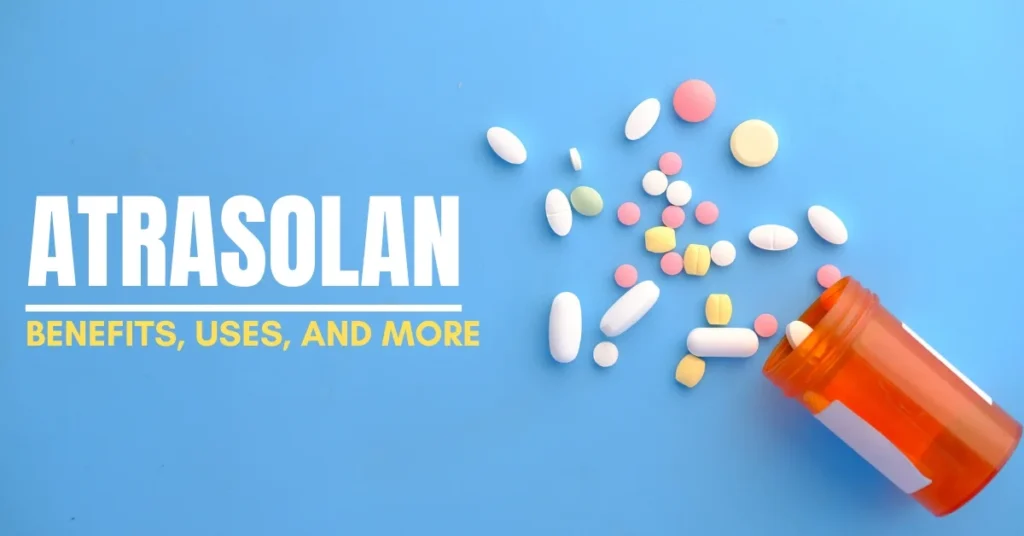In the world of mental health treatment, few medications have garnered as much attention as Atrasolan. Commonly known by its brand name, Xanax, this medication is a powerful tool for managing anxiety and panic disorders. Despite its effectiveness, it’s essential to understand the complexities of this drug, including its benefits, potential risks, and the critical need for careful usage.
What is Atrasolan?
Atrasolan, or Alprazolam, belongs to a class of medications known as benzodiazepines. These drugs are primarily used to treat anxiety and panic disorders by acting on the brain and nerves (central nervous system) to produce a calming effect. Alprazolam works by enhancing the effects of a natural chemical in the body called gamma-aminobutyric acid (GABA). This action helps to reduce the excessive activity in the brain that may lead to anxiety, fear, and other related symptoms.
The Mechanism of Action

Understanding how Alprazolam works requires a closer look at GABA, the neurotransmitter it enhances. GABA’s primary role in the brain is to inhibit or slow down nerve impulses. By amplifying GABA’s effects, Alprazolam reduces the overall activity of the nervous system, which is particularly useful in managing anxiety and panic disorders. This mechanism also explains its sedative properties, making it useful in treating insomnia and muscle tension in some cases.
Primary Uses of Alprazolam
Alprazolam is widely prescribed for a variety of conditions, including:
- Generalized Anxiety Disorder (GAD): Patients with GAD often experience excessive, uncontrollable worry about various aspects of life. Alprazolam can help reduce this anxiety, allowing patients to function more normally.
- Panic Disorder: Characterized by sudden episodes of intense fear, panic disorder can be debilitating. Alprazolam is often used to quickly alleviate the symptoms of a panic attack.
- Insomnia: Although not its primary use, Alprazolam’s sedative properties make it a secondary treatment option for short-term management of insomnia, particularly when anxiety is a contributing factor.
- Muscle Relaxation: In some cases, Alprazolam is prescribed to relieve muscle tension, particularly when this tension is associated with anxiety.
Dosage and Administration
Atrasolan, or Alprazolam is available in various forms, including immediate-release and extended-release tablets. The dosage prescribed can vary widely based on the condition being treated, the patient’s response to the medication, and other factors such as age and overall health.
- Immediate-Release Tablets: These are often prescribed for the quick relief of anxiety or panic symptoms. The effects can be felt within an hour of ingestion and typically last for about 4-6 hours.
- Extended-Release Tablets: Designed for sustained relief, these tablets release Alprazolam slowly over time, providing longer-lasting effects, which can be particularly useful in managing conditions like panic disorder.
- Guidelines for Use: It is crucial to follow the prescribed dosage and schedule strictly. Sudden discontinuation or improper use can lead to severe withdrawal symptoms or other health issues.
Potential Benefits of Alprazolam
When used correctly, Alprazolam offers several significant benefits:
- Effective Anxiety Relief: One of the most immediate benefits of Alprazolam is its ability to reduce anxiety quickly, providing patients with much-needed relief.
- Quick Alleviation of Panic Symptoms: For those experiencing a panic attack, Alprazolam can bring rapid relief, often within minutes.
- Improved Sleep Quality: By reducing anxiety and inducing relaxation, Alprazolam can help improve sleep quality in patients struggling with anxiety-induced insomnia.
- Reduction of Muscle Tension: Its muscle relaxant properties can be beneficial for patients with anxiety-related muscle tension.
Side Effects and Risks
Like all medications, Alprazolam comes with potential side effects and risks that must be carefully considered:
- Common Side Effects: Drowsiness, dizziness, and dry mouth are some of the most frequently reported side effects. These are usually mild and tend to diminish as the body adjusts to the medication.
- Serious Side Effects: In some cases, patients may experience more severe reactions, such as mood changes, hallucinations, or difficulty speaking. If any of these occur, immediate medical attention is necessary.
- Dependency and Withdrawal: One of the most significant risks associated with Alprazolam is the potential for dependency. Long-term use can lead to physical dependence, and abrupt cessation can trigger withdrawal symptoms such as anxiety, agitation, and in severe cases, seizures.
- Long-term Risks: Prolonged use of Alprazolam can also lead to tolerance, meaning higher doses may be required to achieve the same effect, which increases the risk of overdose.
Interactions with Other Medications
Atrasolan, or Alprazolam can interact with various other medications, which can enhance or diminish its effects and potentially lead to dangerous side effects:
- CNS Depressants: Combining Alprazolam with other central nervous system depressants, such as alcohol, opioids, or other benzodiazepines, can increase the risk of severe sedation, respiratory depression, coma, or even death.
- Antidepressants: Some antidepressants can either increase or decrease the levels of Alprazolam in the blood, affecting its efficacy and safety.
- Antifungal Medications: Drugs such as ketoconazole and itraconazole can increase Alprazolam levels, leading to enhanced effects and increased side effects.
Precautions and Warnings
Alprazolam is not suitable for everyone, and certain populations need to exercise extra caution:
- Pregnant and Breastfeeding Women: Alprazolam is not recommended during pregnancy or breastfeeding due to potential risks to the baby, including withdrawal symptoms and respiratory issues.
- Elderly Patients: Older adults may be more sensitive to the sedative effects of Alprazolam, increasing the risk of falls and cognitive impairment.
- Patients with Pre-existing Conditions: Those with conditions such as respiratory disorders, liver disease, or a history of substance abuse should use Alprazolam only under strict medical supervision.
Understanding Withdrawal Symptoms
Withdrawal from Atrasolan, or Alprazolam can be challenging and sometimes dangerous. Symptoms can range from mild to severe, depending on the duration of use and dosage:
- Mild Symptoms: Anxiety, irritability, and restlessness are common mild withdrawal symptoms.
- Severe Symptoms: More severe symptoms can include tremors, seizures, and psychosis. These symptoms require immediate medical attention.
- Safe Discontinuation: To avoid withdrawal symptoms, it’s essential to taper off Alprazolam gradually under a healthcare provider’s supervision, rather than stopping abruptly.
Risks of Overdose
An overdose of Alprazolam can be life-threatening. Signs of an overdose include:
- Extreme Drowsiness: The patient may become excessively sleepy or unresponsive.
- Confusion: Mental confusion and disorientation are common.
- Impaired Coordination: Difficulty in moving or walking can occur.
- Coma or Death: In severe cases, an overdose can lead to coma or death. Immediate medical intervention is critical.
Alprazolam in the Treatment of Insomnia
While Atrasolan, or Alprazolam is not primarily prescribed as a sleep aid, its sedative effects make it effective in treating short-term insomnia, particularly when anxiety is a contributing factor. However, it is generally recommended for short-term use only, as long-term use can lead to dependency and reduced effectiveness.
Clinical Research and Trials
Numerous studies and clinical trials have evaluated the effectiveness and safety of Alprazolam:
- Efficacy in Anxiety and Panic Disorders: Research consistently shows that Alprazolam is highly effective in reducing the symptoms of anxiety and panic disorders, often within hours of administration.
- Comparison with Other Benzodiazepines: Studies comparing Alprazolam with other benzodiazepines have highlighted its rapid onset of action and effectiveness, though it also carries a higher risk of dependency.
- Long-term Use: Research into the long-term use of Alprazolam has shown that while it remains effective, the risks of dependency and withdrawal symptoms increase significantly over time.
Patient Experiences and Testimonials
Patients’ experiences with Alprazolam are varied. Many report significant relief from anxiety and panic attacks, often describing it as life-changing. However, others highlight the challenges of dependency and withdrawal, underscoring the importance of careful usage and close monitoring by healthcare providers.
Conclusion
Atrasolan is a powerful medication that offers significant benefits in treating anxiety and panic disorders. However, it is not without risks, particularly concerning dependency and withdrawal. Patients considering Alprazolam should work closely with their healthcare providers to ensure it is used safely and effectively, and to explore alternative treatments if necessary.
FAQs:
What is Alprazolam used for?
Alprazolam is primarily used to treat anxiety and panic disorders. It may also be used for short-term relief of insomnia and muscle tension associated with anxiety.
How does Alprazolam work?
Alprazolam works by enhancing the effects of GABA, a neurotransmitter that inhibits nerve activity in the brain, leading to a calming effect.
Can Alprazolam be used long-term?
Long-term use of Alprazolam is generally not recommended due to the risks of dependency, tolerance, and withdrawal symptoms.
What are the common side effects of Alprazolam?
Common side effects include drowsiness, dizziness, and dry mouth. Serious side effects can include mood changes, hallucinations, and difficulty speaking.
How should Alprazolam be discontinued?
Alprazolam should be discontinued gradually under the supervision of a healthcare provider to avoid withdrawal symptoms.

